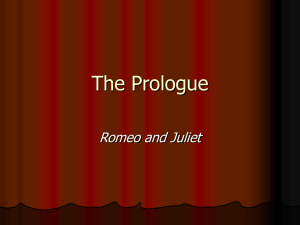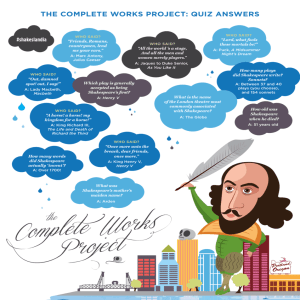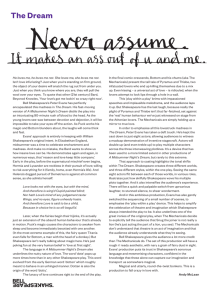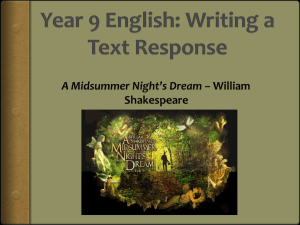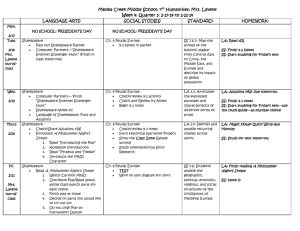Year 8 Essay Writing
advertisement
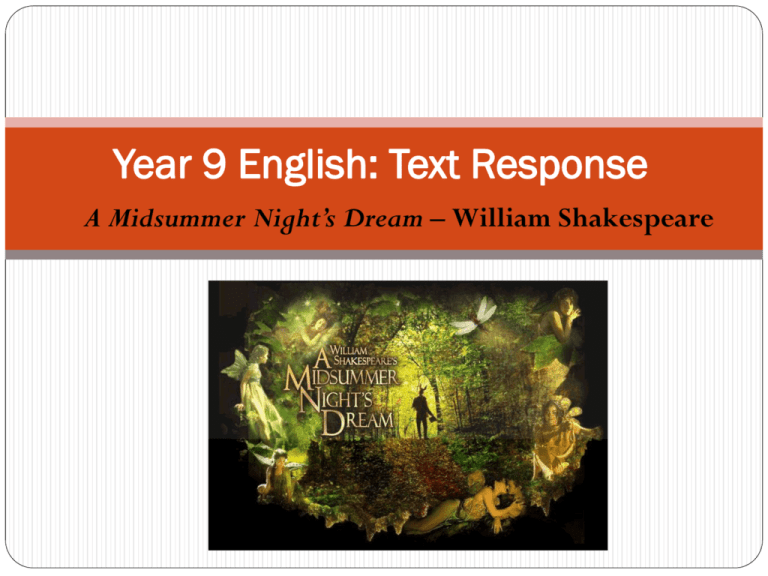
Year 9 English: Text Response A Midsummer Night’s Dream – William Shakespeare Structure of a Text Response There are three parts to a text response: 1. Introduction • • • • A general opening statement about the topic/Background info The text type, text and author CONTENTION: a clear, concise response to the topic An indication of the main points to be taken up in the body paragraphs 2. Body • • • • Paragraph 1 Paragraph 2 Paragraph 3 (Paragraph 4) 3. Conclusion • A clear response to the topic • A brief summary that draws together the main points of the essay Sample Topic: How is love presented in Shakespeare’s A Midsummer Night’s Dream? _____________________________________________________ In order to plan an essay in response to this topic, we need to do the following: 1) Unpack the topic – list the KEY TERMS 2) Develop a list of synonyms of these key terms 3) Explore key ideas within topic 4) Gather evidence (examples and QUOTES from the text) 5) Organise ideas (EXPLANATION) and examples (EVIDENCE) into a plan in order to structure our essay. Exploring the key ideas _____________________________ How is love presented in Shakespeare’s A Midsummer Night’s Dream? Introduction: explore notion of love in the play and Shakespeare’s intention to offer AMSND as a cautionary tale of the power of love. Para 1: Love as irrational Para 2: Love as inconstant and easily manipulated Para 3: Love as a powerful force and an agent for change Exploring the key questions… How is love presented in Shakespeare’s A Midsummer Night’s Dream? William Shakespeare’s play A Midsummer Night’s Dream explores the whimsical, nonsensical and intoxicating nature of love. Through both the mortal and immortal realms, Shakespeare examines the magical quality of love and the many different forms it can take between friends, family and lovers. In both the human and fairy worlds, love is presented as a powerful but also problematic force with the ability to unhinge the characters and also transform them. Through the fiery relations of Oberon and Titania, love can be regarded as irrational and clouded by both conflict and jealousy. By examining the nonsensical relationships of the four lovers, whose affections for each other consistently shift, love can also be regarded as inconstant and easily susceptible to the manipulation of others. While Shakespeare plays with the characters’ affections and creates amusing results for his audience, as the human and fairy worlds merge love also appears to carry a cosmic power that can produce wider effects in the universe. Despite Shakespeare’s light-hearted and playful examination of love, a deeper examination of the play might suggest A Midsummer Night’s Dream as a cautionary tale that urges its audience to consider the dangers of a love without reason. William Shakespeare’s play A Midsummer Night’s Dream explores the whimsical, nonsensical and intoxicating nature of love. Through both the mortal and immortal realms, Shakespeare examines the magical quality of love and the many different forms it can take between friends, family and lovers. In both the human and fairy worlds, love is presented as a powerful but also problematic force with the ability to unhinge the characters and also transform them. Through the fiery relations of Oberon and Titania, love can be regarded as irrational and clouded by both conflict and jealousy. By examining the nonsensical relationships of the four lovers, whose affections for each other consistently shift, love can also be regarded as inconstant and easily susceptible to the manipulation of others. While Shakespeare plays with the characters’ affections and creates amusing results for his audience, as the human and fairy worlds merge love also appears to carry a cosmic power that can produce wider effects in the universe. Despite Shakespeare’s light-hearted and playful examination of love, a deeper examination of the play might suggest A Midsummer Night’s Dream as a cautionary tale that urges its audience to consider the dangers of a love without reason. Text type, text and author Background information on topic Contention Main arguments to be discussed • Use FORMAL language - avoid any slang or informal expressions. Choose interesting, sophisticated vocabulary. • Write in the THIRD person ONLY! Instead of ‘I think..’ Use – ‘It could be argued that…’ or ‘This is evident when…’ • Write in the PRESENT tense (check all of your verbs). • Do NOT ask questions – provide statements instead! • Do NOT use contractions - (a contraction is where you abbreviate a word by adding an apostrophe). Examples: don’t, can’t, should’ve, etc. Instead: do not, cannot, should have • The TITLE of the play should always appear in single quotation marks (when handwritten). • Refer to the playwright initially as ‘William Shakespeare.’ Afterwards, simply use ‘Shakespeare.” T – Topic Sentence: State the main idea/argument of the paragraph. It should ‘set up’ the main point to be discussed. E – Explanation: Expand and elaborate on this key idea in greater detail. E – Evidence: Provide quotes and examples from the text to support your idea.You must DISCUSS and ANALYSE this evidence, explaining how it supports your topic sentence. L – Link: A final statement that ties your ideas together and links them to the next paragraph.You may even wish to use key terms from the next paragraph. Your paragraph should contain at least two pieces of evidence (quotes) that you will need to explain and analyse. For this reason, your paragraph will look like this: Topic Sentence Explanation Evidence Explanation Evidence Explanation Link Through the reckless actions of many key characters, the play presents love as an exceedingly troublesome and irrational emotion. Indeed, both the immortal and mortal characters act impulsively through love and fail to consider the consequences of their actions. Oberon reveals his own lack of judgement in love through his ploy to make Titania “wake when some vile thing is near.” In his rage and desire for revenge over the changeling boy, the Fairy King demonstrates the selfishness and cruelty that can arise in a love that is fuelled by conflict and jealousy. This trickery in love is at times reflected in the fairies’ mystical use of language. Combining pleasant images with vicious intentions, a wicked spell is cast on Titania while she is “lulled in these flowers with dances and delight.” Shakespeare also uses the image of a “winged Cupid painted blind” to highlight how love can transfix and prevent one from seeing clearly. This thoughtlessness is also evident in Helena’s desperate attempt to win Demetrius’ affection, and as she blindly follows him into the woods she willingly forfeits any sense of self-respect. Allowing him to mistreat her and giving him permission to “use [her] but as [his] spaniel,” this otherwise fierce and passionate woman reduces herself to nothing more than an object in the vein hope that “love can transpose to form and dignity.” Similarly, Helena and Lysander are quick to risk their lives for the chance to be together, proving that mutual love can also be plagued by rash decisions. In contrast to these foolish lovers, Theseus is a symbol of order in the play who highlights the lunacy in love when he compares lovers to madmen who have “fantasises that apprehend more than cool reason ever comprehends.” Yet, as the audience soon learns, it is not only a lack of reason but also control that prevents love from remaining pure and constant. Through the reckless actions of many key characters, the play presents love as an exceedingly troublesome and irrational emotion. Indeed, both the immortal and mortal characters act impulsively through love and fail to consider the consequences of their actions. Oberon reveals his own lack of judgement in love through his ploy to make Titania “wake when some vile thing is near.” In his rage and desire for revenge over the changeling boy, the Fairy King demonstrates the selfishness and cruelty that can arise in a love that is fuelled by conflict and jealousy. This trickery in love is at times reflected in the fairies’ mystical use of language. Combining pleasant images with vicious intentions, a wicked spell is cast on Titania while she is “lulled in these flowers with dances and delight.” Shakespeare also uses the image of a “winged Cupid painted blind” to highlight how love can transfix and prevent one from seeing clearly. This thoughtlessness is also evident in Helena’s desperate attempt to win Demetrius’ affection, and as she blindly follows him into the woods she willingly forfeits any sense of self-respect. Allowing him to mistreat her and giving him permission to “use [her] but as [his] spaniel,” this otherwise fierce and passionate woman reduces herself to nothing more than an object in the vein hope that “love can transpose to form and dignity.” Similarly, Helena and Lysander are quick to risk their lives for the chance to be together, proving that mutual love can also be plagued by rash decisions. In contrast to these foolish lovers, Theseus is a symbol of order in the play who highlights the lunacy in love when he compares lovers to madmen who have “fantasises that apprehend more than cool reason ever comprehends.” Yet, as the audience soon learns, it is not only a lack of reason but also control that prevents love from remaining pure and constant. Topic Sentence Explanation Evidence Link • Avoid using a long quote and ‘dumping’ it into your paragraph. • Instead, select a short quote/part of a quote and try placing it into one of your sentences. This is what we call EMBEDDING QUOTATIONS. • Note: If you need to change a quote slightly by adding a word or a letter, you can use square brackets [ ]. Example: Allowing him to mistreat her and giving him permission to “use [her] but as [his] spaniel,” this otherwise fierce and passionate woman reduces herself to nothing more than an object in the vein hope that “love can transpose to form and dignity.” The original words begin,“use me but as your spaniel.” However,“me” and “you” does not fit the grammar of our sentence so we need to change the pronoun to “her” and “his”, using the square brackets to show that the quote is not quite as written in the novel.

